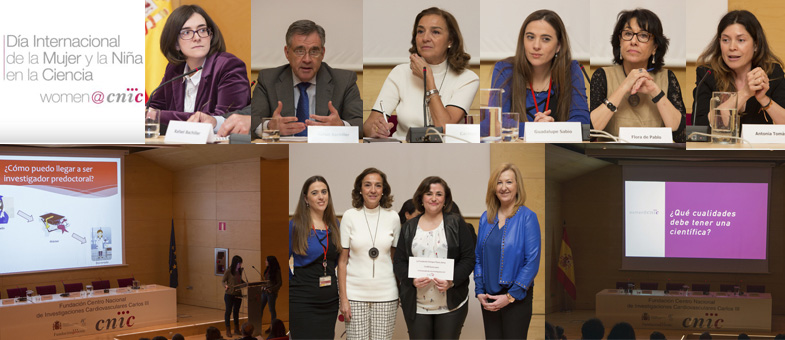CNIC makes a commitment to science and gender equality
The Secretary of State for Research, Development and Innovation, Carmen Vela, participates in a conference held in honor of International Women and Girls in Science Day at the CNIC
What barriers are there in becoming a researcher? What must be changed in the formal and informal educational system in order to get rid of the stereotypes that impede equality in Research and Development? Are the quota systems, removal of language barriers, gender biases in evaluation or the co-responsibility of institutions and families to conciliate personal, professional and family life, positive? These are some of the issues that were debated at the International Women and Girls in Science Day at the Carlos III National Cardiovascular Research Center (CNIC), who counted with the presence of Carmen Vela, Secretary of State for Research, Development and Innovation; Ana Puy, Director of the Women and Science Unit (UMYC); and Jesus F. Crespo, Director of the Carlos III Health Institute.
Science and gender equality are essential to meet the Sustainable Development Goals, included in the UN’s 2030 Agenda. In the last 15 years, the international community has made a big effort to inspire and promote the participation of women and girls in science. Unfortunately, women are still faced with barriers preventing them from fully participating in this field. According to a study conducted in 14 countries, the probability of female students completing a bachelor’s, master’s and PhD in a science-related field is 18%, 8% and 2% respectively, while the probability for male students is 37%, 18% and 6%.
In order to be able to achieve full and equal access and participation in science for women and girls, and moreover to achieve gender equality and empowerment of women and girls, the UN General Assembly decided to proclaim February 11th as International Women and Girls in Science Day.
Research Career
CNIC has participated in this initiative with this conference, and showed a video with several testimonials from female researchers at CNIC in different stages of their research career. With it, they intend to motivate future female researchers not to give up their vocation despite the difficulties they may find along the way. Furthermore, attendants were able to know first-hand the different stages of the scientific career and the importance ‘mentoring’ has on the education of the youngest.
During the discussion panel dedicated to equality and science, which was moderated by the Secretary of State, Carmen Vela, and where Rafael Bachiller, Director of the National Astronomical Observatory; Flora de Pablo, Research Professor of CSIC; Ángela Bernardo, Scientific Journalist; Guadalupe Sabio, Researcher at CNIC, and Antonia Tomás Loba, Researcher at CNIC, also intervened. Some of the issues discussed were education without stereotypes and for equality (co-responsibility and acceptance that we all have bias because of our education), system of quotas and positive actions, formal and informal mentoring, or the structural changes recommended in order to avoid gender bias in the evaluation of scientific production due to “curriculum silence” in maternity and child care.
To close the conference Carmen Vela handed out a grant of 15,000 euros to promote the PhD of a young female researcher. The grant was donated by the Enrique Flores Foundation, represented by Silvia Roo.











